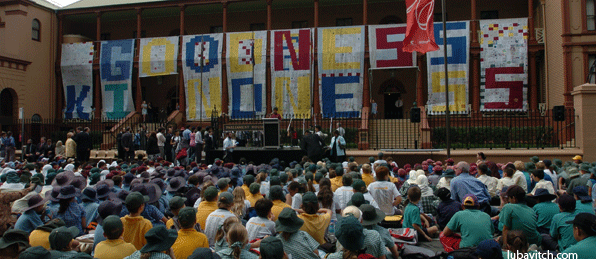(lubavitch.com) A Chabad rabbi was one of three representatives sent by Australia’s federal government recently, to an international peace conference hosted by a Muslim non-governmental organization in Indonesia.
Rabbi Zalman Kastel, Hebrew School director for Chabad of the North Shore in Sydney, was selected to travel to Yogyakarta, Indonesia, because of the work he does, independently of Chabad, with Together for Humanity, a peace education organization he helped establish in 2002.
One hundred academics, religious and political leaders from 31 countries took part in The World Peace Forum, June 30-July 2. Sponsored by Muhammadiya, a 100-year-old Muslim organization with a reported membership 29 million strong, the conference featured sessions on “Mainstreaming Peace Education” and the like.
According to Muhammadiya chairman Din Syamuddin, the forum sought to further the cause of achieving world peace by “increasing policy and cooperative strategy.” Previously, the NGO sponsored World Peace Forums in 2006 and 2008.
Together for Humanity has been “very successful in getting the message across to young people that those from different faiths and traditions can not only live together in harmony, but together they can achieve more than they can apart,” Greg Ralph, director of INA, Indonesia and Regional Issues and East Timor, South-East division, Department of Foreign Affairs and Trade, and his spokespeople told Lubavitch.com. “[Rabbi Kastel’s] foundation has become a role model for young people in countering prejudice and misunderstanding,”
Among representatives from Morocco, Algeria, Egypt, Libya, Italy, Switzerland, Russia, Kosovo, Poland, Bosnia, South Korea, India and countries betwixt and beyond, the peace educators of Israel were notable for their absence. Rabbi Kastel was forthright about his disappointment, and raised it in conversation with delegates around the world. “I didn’t get much response,” he said. “It was not a point I was going to win.”
As the only outwardly observant Jewish delegate Rabbi Kastel felt his very presence at the conference made a statement. “My message was Jews are a compassionate people working for the greater good to increase peace in the world,” said Kastel. He said no one commented on his yarmulke or tzitzit fringes, nor did anyone ask him questions about Judaism. “People treated me like just another person,” he said.
By seeing past Rabbi Kastel’s outer appearance and instead focusing on working toward a mutual goal, conference attendees were echoing Together for Humanity’s aim. The group grew out of a campaign for goodness and kindness initiated by Chabad of the North Shore after the 9-11 terror attacks in New York. “We take the Lubavitcher Rebbe’s approach,” said Rabbi Kastel. “We look at the world and don’t buy into the negative surface facts. But we tune into ‘how could this be better?’”
Shortly after its founding, Together for Humanity (TFH) became its own independent entity with Rabbi Kastel and Sheikh Haisam Farache presenting interactive peace education programs to private and parochial schools across Australia. Their sessions are recognized as fulfilling state mandated curriculum goals in 5 Australian states, and the group has received state and federal funding.
The other two Australian delegates to the forum do similar work. Professor Gary D. Bouma, professor emeritus of sociology at Monash University, is a UNESCO chair of interreligious and intercultural relations. Zuleyha Keskin, the delegation’s presenter, is the vice president of the Affinity Foundation that helps Muslims interact with greater society. An official from Australia’s embassy in Jakarta also attended.
The multicultural delegation contrasted with Australia’s white “g’day mate, let’s go outback tonight” popular image. The delegates “deliver a message to the world about modern Australia—that we are a diverse and inclusive society, which is very appropriately represented by a multi-faith delegation,” according to the Director of INA Greg Ralph.
Forum organizers were “very pleased with the Australian attendees,” according to Director Ralph. “Din Syamsuddin, the head of Muhammadiyah, thanked our Embassy representative personally for the active and engaged Australian participation in the Conference.”
Richard Telfer of Paddington, Sydney has volunteered with Together for Humanity for nearly five years, helping the group reach some 50,000 students. His favorite TFH moment came when a young participant raised her hand after the presentation and asked, “What can I do now? What can I do to stop my family from being so racist today?”
Telfer stays with the program because of these results. “Others bring different groups together look at each other, but we stand together and look to the horizon to understand each other and build towards tomorrow.” When Rabbi Kastel was chosen to attend to forum, Telfer was not surprised. “Zalman is so committed to end racism, it is inspiring.

Be the first to write a comment.